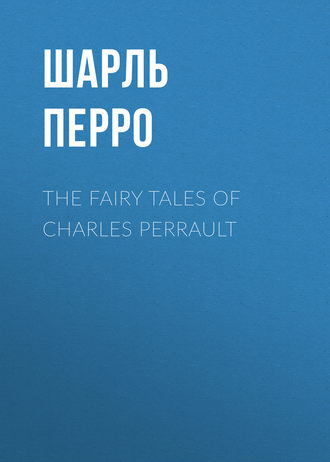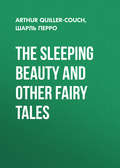
Шарль Перро
The Fairy Tales of Charles Perrault
Cinderilla or The Little Glass Slipper
Once there was a gentleman who married, for his second wife, the proudest and most haughty woman that was ever seen. She had, by a former husband, two daughters of her own humour and they were indeed exactly like her in all things. He had likewise, by another wife, a young daughter, but of unparalleled goodness and sweetness of temper, which she took from her mother, who was the best creature in the world.
No sooner were the ceremonies of the wedding over, but the stepmother began to shew herself in her colours. She could not bear the good qualities of this pretty girl; and the less, because they made her own daughters appear the more odious. She employed her in the meanest work of the house; she scoured the dishes, tables, &c. and rubbed Madam's chamber, and those of Misses, her daughters; she lay up in a sorry garret, upon a wretched straw-bed, while her sisters lay in fine rooms, with floors all inlaid, upon beds of the very newest fashion, and where they had looking-glasses so large, that they might see themselves at their full length, from head to foot.
The poor girl bore all patiently, and dared not tell her father, who would have rattled her off; for his wife governed him intirely. When she had done her work, she used to go into the chimney-corner, and sit down among cinders and ashes, which made her commonly be called Cinder-breech; but the youngest, who was not so rude and uncivil as the eldest, called her Cinderilla. However, Cinderilla, notwithstanding her mean apparel, was a hundred times handsomer than her sisters, tho' they were always dressed very richly.
It happened that the King's son gave a ball, and invited all persons of fashion to it. Our young misses were also invited; for they cut a very grand figure among the quality. They were mightily delighted at this invitation, and wonderfully busy in chusing out such gowns, petticoats, and head-clothes as might best become them. This was a new trouble to Cinderilla; for it was she who ironed her sisters' linen, and plaited their ruffles; they talked all day long of nothing but how they should be dressed. "For my part," said the eldest, "I will wear my red velvet suit, with French trimming." "And I," said the youngest, "shall only have my usual petticoat; but then, to make amends for that, I will put on my gold-flowered manteau, and my diamond stomacher, which is far from being the most ordinary one in the world." They sent for the best tire-woman they could get, to make up their head-dresses, and adjust their double-pinners,3 and they had their red brushes, and patches from the fashionable maker.
Cinderilla was likewise called up to them to be consulted in all these matters, for she had excellent notions, and advised them always for the best, nay and offered her service to dress their heads, which they were very willing she should do. As she was doing this, they said to her:
"Cinderilla, would you not be glad to go to the ball?"
"Ah!" said she, "you only jeer at me; it is not for such as I am to go thither."
"Thou art in the right of it," replied they, "it would make the people laugh to see a Cinder-breech at a ball."
Any one but Cinderilla would have dressed their heads awry, but she was very good, and dressed them perfectly well. They were almost two days without eating, so much they were transported with joy; they broke above a dozen of laces in trying to be laced up close, that they might have a fine slender shape, and they were continually at their looking-glass. At last the happy day came; they went to Court, and Cinderilla followed them with her eyes as long as she could, and when she had lost sight of them she fell a-crying.
Her godmother, who saw her all in tears, asked her what was the matter.
"I wish I could – , I wish I could – ;" she was not able to speak the rest, being interrupted by her tears and sobbing.
This godmother of hers, who was a Fairy, said to her:
"Thou wishest thou couldest go to the ball, is it not so?"
"Y – es," cried Cinderilla, with a great sigh.
"Well," said her godmother, "be but a good girl, and I will contrive that thou shalt go." Then she took her into her chamber, and said to her:
"Run into the garden, and bring me a pumpkin."
Cinderilla went immediately to gather the finest she could get, and brought it to her godmother, not being able to imagine how this pumpkin could make her go to the ball. Her godmother scooped out all the inside of it, leaving nothing but the rind; which done, she struck it with her wand, and the pumpkin was instantly turned into a fine coach, gilded all over with gold.
She then went to look into her mouse-trap, where she found six mice all alive, and ordered Cinderilla to lift up a little the trap-door, when giving each mouse, as it went out, a little tap with her wand, the mouse was at that moment turned into a fair horse, which altogether made a very fine set of six horses of a beautiful mouse-coloured dapple-grey.
Being at a loss for a coachman, "I will go and see," says Cinderilla, "if there be never a rat in the rat-trap, that we may make a coachman of him."
"Thou art in the right," replied her godmother; "go and look."
Cinderilla brought the trap to her, and in it there were three huge rats. The Fairy made choice of one of the three, which had the largest beard, and, having touched him with her wand, he was turned into a fat jolly coachman, who had the smartest whiskers eyes ever beheld.
After that, she said to her:
"Go again into the garden, and you will find six lizards behind the watering pot; bring them to me."
She had no sooner done so, but her godmother turned them into six footmen, who skipped up immediately behind the coach, with their liveries all bedaubed with gold and silver, and clung as close behind it, as if they had done nothing else their whole lives. The Fairy then said to Cinderilla:
"Well, you see here an equipage fit to go to the ball with; are you not pleased with it?"
"O yes," cried she, "but must I go thither as I am, in these poison nasty rags?"
Her godmother only just touched her with her wand, and, at the same instant, her clothes were turned into cloth of gold and silver, all beset with jewels. This done she gave her a pair of glass-slippers,4 the prettiest in the whole world.
Being thus decked out, she got up into her coach; but her godmother, above all things, commanded her not to stay till after midnight, telling her, at the same time, that if she stayed at the ball one moment longer, her coach would be a pumpkin again, her horses mice, her coachman a rat, her footmen lizards, and her clothes become just as they were before.
She promised her godmother, she would not fail of leaving the ball before midnight; and then away she drove, scarce able to contain herself for joy. The King's son, who was told that a great Princess, whom nobody knew, was come, ran out to receive her; he gave her his hand as she alighted out of the coach, and led her into the hall, among all the company. There was immediately a profound silence, they left off dancing, and the violins ceased to play, so attentive was every one to contemplate the singular beauty of this unknown new comer. Nothing was then heard but a confused noise of,
"Ha! how handsome she is! Ha! how handsome she is!"
The King himself, old as he was, could not help ogling her, and telling the Queen softly, "that it was a long time since he had seen so beautiful and lovely a creature." All the ladies were busied in considering her clothes and head-dress, that they might have some made next day after the same pattern, provided they could meet with such fine materials, and as able hands to make them.
The King's son conducted her to the most honourable seat, and afterwards took her out to dance with him: she danced so very gracefully, that they all more and more admired her. A fine collation was served up, whereof the young Prince ate not a morsel, so intently was he busied in gazing on her. She went and sat down by her sisters, shewing them a thousand civilities, giving them part of the oranges and citrons which the Prince had presented her with; which very much surprised them, for they did not know her.
While Cinderilla was thus amusing her sisters, she heard the clock strike eleven and three quarters, whereupon she immediately made a curtesy to the company, and hasted away as fast as she could.
Being got home, she ran to seek out her godmother, and after having thanked her, she said, "she could not but heartily wish she might go next day to the ball, because the King's son had desired her." As she was eagerly telling her godmother whatever had passed at the ball, her two sisters knocked at the door which Cinderilla ran and opened.
"How long you have stayed," cried she, gaping, rubbing her eyes, and stretching herself as if she had been just awaked out of her sleep; she had not, however, any manner of inclination to sleep since they went from home.
"If thou hadst been at the ball," said one of her sisters, "thou wouldst not have been tired with it; there came thither the finest Princess, the most beautiful ever was seen with mortal eyes; she shewed us a thousand civilities, and gave us oranges and citrons." Cinderilla was transported with joy; she asked them the name of that Princess; but they told her they did not know it; and that the King's son was very anxious to learn it, and would give all the world to know who she was. At this Cinderilla, smiling, replied:
"She must then be very beautiful indeed; Lord! how happy have you been; could not I see her? Ah! dear Miss Charlotte, do lend me your yellow suit of cloaths which you wear every day!"
"Ay, to be sure!" cried Miss Charlotte, "lend my cloaths to such a dirty Cinder-breech as thou art; who's the fool then?"
Cinderilla, indeed, expected some such answer, and was very glad of the refusal; for she would have been sadly put to it, if her sister had lent her what she asked for jestingly.
The next day the two sisters were at the ball, and so was Cinderilla, but dressed more magnificently than before. The King's son was always by her, and never ceased his compliments and amorous speeches to her; to whom all this was so far from being tiresome, that she quite forgot what her godmother had recommended to her, so that she, at last, counted the clock striking twelve, when she took it to be no more than eleven; she then rose up, and fled as nimble as a deer.
The Prince followed, but could not overtake her. She left behind one of her glass slippers, which the Prince took up most carefully. She got home, but quite out of breath, without coach or footmen, and in her nasty old cloaths, having nothing left her of all her finery, but one of the little slippers, fellow to that she dropped. The guards at the palace gate were asked if they had not seen a Princess go out; who said, they had seen nobody go out, but a young girl, very meanly dressed, and who had more the air of a poor country wench, than a gentle-woman.
When the two sisters returned from the ball, Cinderilla asked them if they had been well diverted, and if the fine lady had been there. They told her, Yes, but that she hurried away immediately when it struck twelve, and with so much haste, that she dropped one of her little glass slippers, the prettiest in the world, and which the King's son had taken up; that he had done nothing but look at it during all the latter part of the ball, and that most certainly he was very much in love with the beautiful person who owned the little slipper.
What they said was very true; for a few days after, the King's son caused it to be proclaimed by sound of trumpet, that he would marry her whose foot this slipper would just fit. They whom he employed began to try it on upon the Princesses, then the duchesses, and all the Court, but in vain. It was brought to the two sisters, who did all they possibly could to thrust their feet into the slipper, but they could not effect it.
Cinderilla, who saw all this, and knew her slipper, said to them laughing:
"Let me see if it will not fit me?"
Her sisters burst out a-laughing, and began to banter her. The gentleman who was sent to try the slipper, looked earnestly at Cinderilla, and finding her very handsome, said it was but just that she should try, and that he had orders to let every one make tryal. He invited Cinderilla to sit down, and putting the slipper to her foot, he found it went on very easily, and fitted her, as if it had been made of wax. The astonishment her two sisters were in was excessively great, but still abundantly greater, when Cinderilla pulled out of her pocket the other slipper, and put it on her foot. Thereupon, in came her godmother, who having touched, with her wand, Cinderilla's cloaths, made them richer and more magnificent than any of those she had before.
And now her two sisters found her to be that fine beautiful lady whom they had seen at the ball. They threw themselves at her feet, to beg pardon for all the ill treatment they had made her undergo. Cinderilla took them up, and as she embraced them, cried that she forgave them with all her heart, and desired them always to love her.
She was conducted to the young Prince, dressed as she was; he thought her more charming than ever, and, a few days after, married her.
Cinderilla, who was no less good than beautiful, gave her two sisters lodgings in the palace, and that very same day matched them with two great lords of the court.
The Moral
Beauty's to the sex a treasure,
Still admir'd beyond all measure,
And never yet was any known,
By still admiring, weary grown.
But that rare quality call'd grace,
Exceeds, by far, a handsome face;
Its lasting charms surpass the other,
And this rich gift her kind godmother
Bestow'd on Cinderilla fair,
Whom she instructed with such care.
She gave to her such graceful mien,
That she, thereby, became a queen.
For thus (may ever truth prevail)
We draw our moral from this tale.
This quality, fair ladies, know
Prevails much more (you'll find it so)
T'ingage and captivate a heart,
Than a fine head dress'd up with art.
The fairies' gift of greatest worth
Is grace of bearing, not high birth;
Without this gift we'll miss the prize;
Possession gives us wings to rise.
Another
A great advantage 'tis, no doubt, to man,
To have wit, courage, birth, good sense, and brain,
And other such-like qualities, which we
Receiv'd from heaven's kind hand, and destiny.
But none of these rich graces from above,
To your advancement in the world will prove
If godmothers and sires you disobey,
Or 'gainst their strict advice too long you stay.
Riquet with the Tuft
There was, once upon a time, a Queen, who was brought to bed of a son, so hideously ugly, that it was long disputed, whether he had human form. A Fairy, who was at his birth, affirmed, he would be very lovable for all that, since he should be indowed with abundance of wit. She even added, that it would be in his power, by virtue of a gift she had just then given him, to bestow on the person he most loved as much wit as he pleased. All this somewhat comforted the poor Queen, who was under a grievous affliction for having brought into the world such an ugly brat. It is true, that this child no sooner began to prattle, but he said a thousand pretty things, and that in all his actions there was something so taking, that he charmed every-body. I forgot to tell you, that he came into the world with a little tuft of hair upon his head, which made them call him Riquet with the Tuft, for Riquet was the family name.
Seven or eight years after this, the Queen of a neighbouring kingdom was delivered of two daughters at a birth. The first-born of these was beautiful beyond compare, whereat the Queen was so very glad, that those present were afraid that her excess of joy would do her harm. The same Fairy, who had assisted at the birth of little Riquet with the Tuft, was here also; and, to moderate the Queen's gladness, she declared, that this little Princess should have no wit at all, but be as stupid as she was pretty. This mortified the Queen extreamly, but some moments afterwards she had far greater sorrow; for, the second daughter she was delivered of, was very ugly.
"Do not afflict yourself so much, Madam," said the Fairy; "your daughter shall have so great a portion of wit, that her want of beauty will scarcely be perceived."
"God grant it," replied the Queen; "but is there no way to make the eldest, who is so pretty, have some little wit?"
"I can do nothing for her, Madam, as to wit," answered the Fairy, "but everything as to beauty; and as there is nothing but what I would do for your satisfaction, I give her for gift, that she shall have the power to make handsome the person who shall best please her."
As these Princesses grew up, their perfections grew up with them; all the public talk was of the beauty of the eldest, and the wit of the youngest. It is true also that their defects increased considerably with their age; the youngest visibly grew uglier and uglier, and the eldest became every day more and more stupid; she either made no answer at all to what was asked her, or said something very silly; she was with all this so unhandy, that she could not place four pieces of china upon the mantlepiece, without breaking one of them, nor drink a glass of water without spilling half of it upon her cloaths. Tho' beauty is a very great advantage in young people, yet here the youngest sister bore away the bell, almost always, in all companies from the eldest; people would indeed, go first to the Beauty to look upon, and admire her, but turn aside soon after to the Wit, to hear a thousand most entertaining and agreeable turns, and it was amazing to see, in less than a quarter of an hour's time, the eldest with not a soul with her and the whole company crowding about the youngest. The eldest, tho' she was unaccountably dull, could not but notice it, and would have given all her beauty to have half the wit of her sister. The Queen, prudent as she was, could not help reproaching her several times, which had like to have made this poor Princess die for grief.
One day, as she retired into the wood to bewail her misfortune, she saw, coming to her, a little man, very disagreeable, but most magnificently dressed. This was the young Prince Riquet with the Tuft, who having fallen in love with her, by seeing her picture, many of which went all the world over, had left his father's kingdom, to have the pleasure of seeing and talking with her.
Overjoyed to find her thus all alone, he addressed himself to her with all imaginable politeness and respect. Having observed, after he had made her the ordinary compliments, that she was extremely melancholy, he said to her:
"I cannot comprehend, Madam, how a person so beautiful as you are, can be so sorrowful as you seem to be; for tho' I can boast of having seen infinite numbers of ladies exquisitely charming, I can say that I never beheld any one whose beauty approaches yours."
"You are pleased to say so," answered the Princess, and here she stopped.
"Beauty," replied Riquet with the Tuft, "is such a great advantage, that it ought to take the place of all things; and since you possess this treasure, I see nothing that can possibly very much afflict you."
"I had far rather," cried the Princess, "be as ugly as you are, and have wit, than have the beauty I possess, and be so stupid as I am."
"There is nothing, Madam," returned he, "shews more that we have wit, than to believe we have none; and it is the nature of that excellent quality, that the more people have of it, the more they believe they want it."
"I do not know that," said the Princess; "but I know, very well, that I am very senseless, and thence proceeds the vexation which almost kills me."
"If that be all, Madam, which troubles you, I can very easily put an end to your affliction."
"And how will you do that?" cried the Princess.
"I have the power, Madam," replied Riquet with the Tuft, "to give to that person whom I shall love best, as much wit as can be had; and as you, Madam, are that very person, it will be your fault only, if you have not as great a share of it as any one living, provided you will be pleased to marry me."
The Princess remained quite astonished, and answered not a word.
"I see," replied Riquet with the Tuft, "that this proposal makes you very uneasy, and I do not wonder at it, but I will give you a whole year to consider of it."
The Princess had so little wit, and, at the same time, so great a longing to have some, that she imagined the end of that year would never be; therefore she accepted the proposal which was made her. She had no sooner promised Riquet with the Tuft that she would marry him on that day twelvemonth, than she found herself quite otherwise than she was before; she had an incredible facility of speaking whatever she pleased, after a polite, easy, and natural manner; she began that moment a very gallant conversation with Riquet with the Tuft, wherein she tattled at such a rate, that Riquet with the Tuft believed he had given her more wit than he had reserved for himself.
When she returned to the palace, the whole Court knew not what to think of such a sudden and extraordinary change; for they heard from her now as much sensible discourse, and as many infinitely witty turns, as they had stupid and silly impertinences before. The whole Court was overjoyed at it beyond imagination; it pleased all but her younger sister; because having no longer the advantage of her in respect of wit, she appeared, in comparison of her, a very disagreeable, homely puss. The King governed himself by her advice, and would even sometimes hold a council in her apartment. The noise of this change spreading every where, all the young Princes of the neighbouring kingdoms strove all they could to gain her favour, and almost all of them asked her in marriage; but she found not one of them had wit enough for her, and she gave them all a hearing, but would not engage herself to any.
However, there came one so powerful, rich, witty and handsome, that she could not help having a good inclination for him. Her father perceived it, and told her that she was her own mistress as to the choice of a husband, and that she might declare her intentions. As the more wit we have, the greater difficulty we find to make a firm resolution upon such affairs, this made her desire her father, after having thanked him, to give her time to consider of it.
She went accidentally to walk in the same wood where she met Riquet with the Tuft, to think, the more conveniently, what she ought to do. While she was walking in a profound meditation, she heard a confused noise under her feet, as it were of a great many people who went backwards and forwards, and were very busy. Having listened more attentively, she heard one say:
"Bring me that pot"; another "Give me that kettle"; and a third, "Put some wood upon the fire."
The ground at the same time opened, and she seemingly saw under her feet, a great kitchen full of cooks, scullions, and all sorts of servants necessary for a magnificent entertainment. There came out of it a company of roasters, to the number of twenty, or thirty, who went to plant themselves in a fine alley of wood, about a very long table, with their larding pins in their hands, and skewers in their caps, who began to work, keeping time, to the tune of a very harmonious song.
The Princess, all astonished at this sight, asked them who they worked for.
"For Prince Riquet with the Tuft," said the chief of them, "who is to be married to-morrow."
The Princess was more surprised than ever, and recollecting that it was now that day twelvemonth on which she had promised to marry Riquet with the Tuft, she was like to sink into the ground.
What made her forget this was that, when she made this promise, she was very silly, and having obtained that vast stock of wit which the Prince had bestowed on her, she had intirely forgot her stupidity. She continued walking, but had not taken thirty steps before Riquet with the Tuft presented himself to her, bravely and most magnificently dressed, like a Prince who was going to be married.
"You see, Madam," said he, "I am very exact in keeping my word, and doubt not, in the least, but you are come hither to perform yours, and to make me, by giving me your hand, the happiest of men."
"I shall freely own to you," answered the Princess, "that I have not yet taken any resolution on this affair, and believe I never shall take such a one as you desire."
"You astonish me, Madam," said Riquet with the Tuft.
"I believe it," said the Princess, "and surely if I had to do with a clown, or a man of no wit, I should find myself very much at a loss. 'A Princess always observes her word,' would he say to me, 'and you must marry me, since you promised to do so.' But as he whom I talk to is the man of the world who is master of the greatest sense and judgment, I am sure he will hear reason. You know, that when I was but a fool, I could, notwithstanding, never come to a resolution to marry you; why will you have me, now I have so much judgment as you gave me, and which makes me a more difficult person than I was at that time, to come to such a resolution, which I could not then determine to agree to? If you sincerely thought to make me your wife, you have been greatly in the wrong to deprive me of my dull simplicity, and make me see things much more clearly than I did."
"If a man of no wit and sense," replied Riquet with the Tuft, "would be entitled, as you say, to reproach you for breach of your word, why will you not let me, Madam, do likewise in a matter wherein all the happiness of my life is concerned? Is it reasonable that persons of wit and sense should be in a worse condition than those who have none? Can you pretend this; you who have so great a share, and desired so earnestly to have it? But let us come to fact, if you please. Setting aside my ugliness and deformity, is there any thing in me which displeases you? Are you dissatisfied with my birth, my wit, humour, or manners?"
"Not at all," answered the Princess; "I love you and respect you in all that you mention." "If it be so," said Riquet with the Tuft, "I am like to be happy, since it is in your power to make me the most lovable of men."
"How can that be?" said the Princess.
"It will come about," said Riquet with the Tuft; "if you love me enough to wish it to be so; and that you may no ways doubt, Madam, of what I say, know that the same Fairy, who, on my birth-day, gave me for gift the power of making the person who should please me extremely witty and judicious, has, in like manner, given you for gift the power of making him, whom you love, and would grant that favour to, extremely handsome."
"If it be so," said the Princess, "I wish, with all my heart, that you may be the most lovable Prince in the world, and I bestow it on you, as much as I am able."
The Princess had no sooner pronounced these words, but Riquet with the Tuft appeared to her the finest Prince upon earth; the handsomest and most amiable man she ever saw. Some affirm that it was not the enchantments of the Fairy which worked this change, but that love alone caused the metamorphosis. They say, that the Princess, having made due reflection on the perseverance of her lover, his discretion, and all the good qualities of his mind, his wit and judgment, saw no longer the deformity of his body, nor the ugliness of his face; that his hump seemed to her no more than the homely air of one who has a broad back; and that whereas till then she saw him limp horribly, she found it nothing more than a certain sidling air, which charmed her. They say farther, that his eyes, which were very squinting, seemed to her all the more bright and sparkling; that their irregularity passed in her judgment for a mark of a violent excess of love; and, in short, that his great red nose had, in her opinion, somewhat of the martial and heroic.







